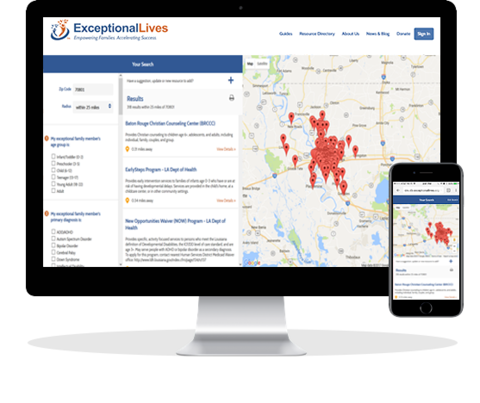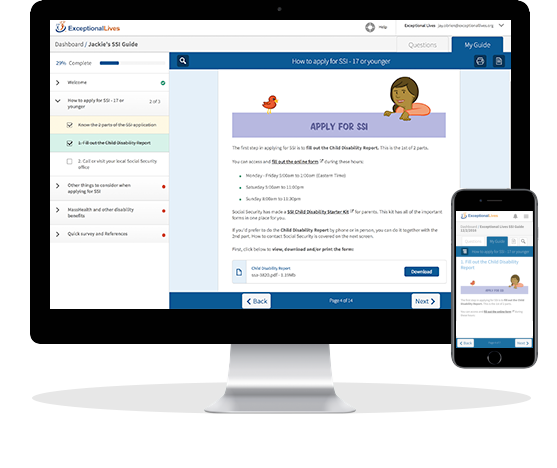
Desktop and mobile images of Exceptional Lives Resource Directory
Photo credit: Exceptional Lives.
Executive Summary
Exceptional Lives (ELI) provides free, easy-to-understand resources for parents and caregivers of children with disabilities, as well as professionals who work with this population. Their “How To” Guides and Resource Directory utilize health literacy principles and are written in plain language. ELI’s unique software provides users with individualized information and offers action steps to help their exceptional children thrive.
Article
You’ve just received your child’s diagnosis: autism, intellectual disability, cerebral palsy, or visual impairment. Sifting through websites, you start thinking of many questions. How will you find occupational therapists for your child? How will you learn what occupational therapy is? Will your child ever live on his own? Will she have a job? What about your other children -- how will you support them while caring for your child who is going to need extra resources? As you become immersed in trying to understand what this means for your child and family, you hear many new terms: Supplemental Security Income (SSI), Individualized Education Program (IEP), Medicaid, special education. You have started to explore government websites but there is too much text and the quantity of information is overwhelming.
That’s where we come in. Exceptional Lives (ELI) is a Boston-based not-for-profit that provides a free online information platform to parents and caregivers of children with disabilities, as well as professionals who work with this population. Our resources are currently available in Massachusetts and Louisiana, and we are adding to our national database as well. We empower and support families and professionals. By providing easy-to-follow information, we equip individuals with the tools to access programs and services on their own. We provide “need to know” information to all users, with additional guidance and resources available for those who want to learn more.

Desktop and mobile images of Exceptional Lives Guide
Photo Credit: Exceptional Lives
The platform includes “How-To” Guides that help parents navigate disability-related processes such as applying for SSI, obtaining Early Intervention services, qualifying for special education services, and creating an effective IEP. Parents answer a series of questions and our software generates a customized Guide with information specific to their own situation. The Guide walks the user through each process using plain language and other evidence-based health literacy design principles, such as chunking of text, careful balance of graphics and white space, and user-experience texting for varying literacy levels and familiarity with disability services.
This incorporation of health literacy principles is a key piece of why ELI works, and what differentiates our resources from others. Research shows that 15 percent of low-income families have a child with a disability, and nine percent of those families have a child with a severe disability.
As health literate resources become more available, there is still a gap in filling the informational needs of parents and children with disabilities. Online information is often difficult to navigate or trust, and doctors are rarely able to lead families to the information they need and can understand. To reach a wider audience, we write our materials at a sixth-grade reading level to ensure they are accessible to users while still maintaining accuracy. The Guides include in-text definitions, links to external websites, and pop-up boxes with additional information on various topics.
To ensure credibility and reliability, the ELI team uses a three-step process to create each Guide: interviews with parents, interviews with professionals in the field, and interviews with appropriate government agencies that oversee the general area in which the Guide falls. The Guides are actionable, meaning they not only inform parents of their rights, the processes, and the resources that are available to them, but the Guides also provide interactive, step-by-step instructions on how to navigate each required activity.
The platform also includes a free, user-friendly Disability Resource Directory, a searchable online database with visual mapping of disability-related services and providers. Users can search by zip code and search radius, with optional filters that include age of child, primary diagnosis, and various therapies, services, programs, and other supports. Users can also print the provider’s description and directions. The Massachusetts Resource Directory contains more than 1,500 resources in 54 service categories in areas such as: therapy (including speech, physical therapy, occupational therapy, and Applied Behavior Analysis providers); education; employment (including transition & vocational programs); medical & clinical; adult programs (including housing & transportation services); parent & caregiver support; legal help; social & recreational (including after-school programs & summer camps); and family financial grants, sibling support groups, and more.
Feedback from parents and professional care providers shows that immediately upon its launch in April 2017, the ELI Resource Directory was the most user-friendly disability resource directory available in Massachusetts. We have received similar feedback from the launch of our Louisiana Resource Directory in August 2017.
Each search generates a printable resource list and a visual resource map displaying options in your geographical area. As with our Guides, in the Resource Directory we show users only what is relevant to their unique situation, and filter out what isn’t. Users can also drill down into individual resources for a full description including contact information, website, and directions. Our plain language descriptions of each service help to make sense of the acronyms, abbreviations, and other new terms that are becoming part of the user’s vocabulary.
Our vetting process is exhaustive and separates us from other resource directories. Our team of data specialists has researched, tagged by age and disability type, and reviewed each resource entry. We are vigilant about keeping all Directory content accurate and up-to-date. Our software detects broken or outdated web links for immediate attention, and our Directory team performs proactive record checks for each resource every six months.
Our information platform is free and available 24/7 on any web-connected device. We provide free professional support through our telephone helpline and email and chat features. To support users as best we can, our team members can simultaneously access the Guide along with the user if they get stuck, and can also direct users to a particular resource if their challenge is more complex than can be answered in the Guides or Directory.
At ELI, we measure success by not only the number of people we reach, but also by the quality of the interactions users have with our platform and the action steps they take thereafter. We collect quantitative and qualitative data to allow us to best identify needs and effectively advocate for families. For example, our analytics allow us to identify how many users in particular geographic areas have searched for certain services or providers. If we find that these users have received zero results within 25 miles of their zip code, we can share that information with other providers throughout the state and perhaps influence the state legislators to provide incentives for local universities to train more providers and encourage them to work in these identified regions.
So, while this new diagnosis brings with it a myriad of emotions, stress and questions, ELI is here to help parents and professionals alike navigate through the world of services and supports, and equip you with the information and resources you need to help your exceptional children thrive.
Works Cited:
“Children with Disabilities and Other Special Needs: Opportunities to Participate in Quality Programs Must Be Expanded,” Children’s Defense Fund, Link.
Author Bio
Ricki Meyer
Ricki Meyer is the Director of Policy and Legal Operations for Exceptional Lives. She holds a J.D. from the Boston University School of Law, Ed.M. from the Harvard Graduate School of Education, and B.S. from Northwestern University. She has experience working on education and disability policy issues at the state and federal levels. She is licensed to practice law in Massachusetts.


